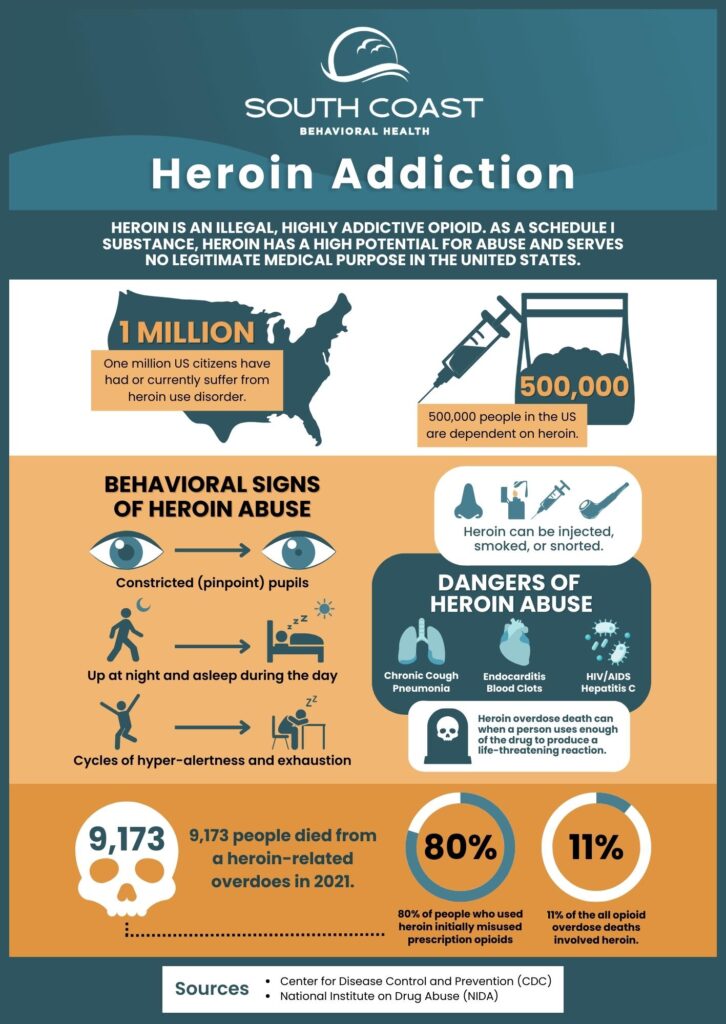Heroin Addiction
Heroin addiction is a harrowing and pervasive issue that affects countless individuals and families worldwide. As one of the most potent and addictive opioid drugs, heroin use can lead to a host of physical, mental, and societal challenges. This addiction often takes hold rapidly, with users experiencing intense cravings and withdrawal symptoms when not using the drug.c
This addictive drug, found in various forms such as Vicodin and Lortab, can lead individuals down a path of physical and psychological dependence. Understanding the signs, symptoms, and treatment options for hydrocodone addiction is essential to addressing this pressing issue.

What Is Heroin Addiction?
Heroin addiction, which falls into the category of opioid use disorder (OUD), is a distressing and challenging condition marked by the compulsive use of heroin, a powerful opioid drug derived from morphine. Heroin causes rapid and intense onset of effects. This contributes to its high potential for abuse. Heroin addiction can quickly take hold. This leads to a range of physical, mental, and social repercussions. According to data from the World Health Organization, an estimated 10.3 million people worldwide misuse opioids, which includes heroin.
The National Institute on Drug Abuse explains that heroin typically appears in two main forms: a white or brown powder or a black, sticky substance known as “black tar” heroin. It is made from opium poppies. Heroin use involves intravenous injection, smoking, or snorting. Injection is the most common and often considered the most dangerous method due to the risk of infections and overdose. Understanding the allure and dangers of this drug is essential for addressing the pervasive problem of heroin addiction.
Why Is Heroin Dangerous?
Heroin is immensely dangerous. It poses risks that extend to physical, mental, and behavioral aspects of an individual’s life. Physically, the drug can lead to a myriad of health problems. The use of heroin can result in respiratory depression and nervous system stress, putting users at risk of overdosing. It can also suppress the immune system. This makes users more vulnerable to infections. The method of administration, particularly intravenous injection, increases the likelihood of contracting diseases like HIV and hepatitis. This is due to shared needles and unsterile practices.
Mentally, heroin is perilous as it can lead to intense psychological dependence. Users often experience a profound euphoria followed by a deep sense of relaxation and detachment from reality. This creates a strong desire for continued use to recapture those feelings. That can lead to a rapid downward spiral into addiction. Behaviorally, heroin addiction can be devastating. Users frequently engage in risky behaviors to obtain the drug. This includes criminal activities, which can result in incarceration and strained relationships with friends and family. The dangers of heroin reach far and underscore the need for prevention and treatment efforts to combat its devastating effects.
Heroin Addiction and Mental Health
Heroin addiction is closely intertwined with mental health, and many individuals struggling with substance use disorders like heroin also experience co-occurring mental health issues. Dual diagnosis or co-occurring disorders refer to the presence of both a substance use disorder and a mental health disorder in an individual.
The link between heroin addiction and mental health problems is complex. Some individuals may turn to heroin as a form of self-medication to alleviate the symptoms of underlying mental health issues such as depression, anxiety, or post-traumatic stress disorder. Conversely, heroin addiction can worsen existing mental health conditions or even trigger new ones due to the drug’s effects on brain chemistry.
Statistics show that co-occurring disorders are prevalent among people seeking addiction treatment. According to the Substance Abuse and Mental Health Services Administration (SAMHSA), approximately 7.9 million adults in the United States had co-occurring disorders in 2019. Effective treatment for heroin addiction should address these underlying mental health issues to provide comprehensive care.
When Do You Need Heroin Addiction Treatment?
Seeking heroin addiction treatment is crucial when individuals find themselves trapped in a cycle of heroin use that causes severe physical, mental, and social consequences. There are several indicators that it’s time to seek help:
- Loss of Control: When someone repeatedly tries to quit or control their heroin use but fails, it's a sign of addiction. A sense of powerlessness over heroin is a clear signal.
- Physical and Mental Health Deterioration: Heroin abuse can lead to numerous health issues, including overdose, infections, cardiovascular problems, and mental health disorders. When these problems escalate, it's time to consider treatment.
- Strained Relationships: Heroin addiction often causes interpersonal conflicts, strained relationships with loved ones, and isolation. When these problems become severe, intervention may help.
- Neglected Responsibilities: Failing to meet responsibilities at work, school, or home due to heroin use is a strong indication of a problem that requires treatment.
- Legal Issues: If heroin use results in legal problems, such as arrests or legal charges, it's a sign that addiction is affecting all aspects of life.
- Overdose Risk: The risk of a heroin overdose is particularly high with escalating use. If someone experiences or witnesses an overdose, it should serve as a wake-up call to get professional help.
- Withdrawal Symptoms: When attempting to quit or cut down on heroin, individuals experience withdrawal symptoms like intense cravings, nausea, and pain. These symptoms can be a clear sign that it's time to seek help.
The serious problems caused by heroin addiction underscore the importance of timely and effective treatment to prevent further harm and improve one’s quality of life.
Heroin Addiction Treatment Options
Heroin addiction is a complex condition treated using various approaches, often tailored to an individual’s specific needs. Here are some of the common ways heroin addiction is treated:

Heroin addiction treatment begins with a thorough assessment by addiction treatment professionals to determine the severity of the addiction and identify any co-occurring mental health disorders. This clinical assessment guides the development of a client’s individualized treatment plan.
The first step in heroin addiction treatment involves a medically supervised heroin detox. During the detox process, clients are under 24/7 supervision to ensure that all toxins are safely removed from the body. Clinicians also provide a range of evidence-based interventions to manage the symptoms of withdrawal.
Inpatient programs tailored for individuals in the early stages of heroin addiction recovery offer invaluable support. These intensive and immersive programs empower clients to delve into the underlying causes of their addiction and begin healing. By fostering healthier coping strategies, inpatient care helps clients embark on a sustainable path toward long-term recovery.
Medication-assisted treatment (MAT) for heroin addiction can incorporate medication for opioid use disorders (MOUD) such as methadone, buprenorphine, or naltrexone. MAT can assist in the management of cravings and heroin withdrawal symptoms, allowing individuals to focus on recovery.
Many individuals with heroin addiction have co-occurring mental health disorders. Dual diagnosis treatment addresses both addiction and mental health issues concurrently, providing comprehensive care.
Holistic and alternative therapies like acupuncture, yoga, mindfulness meditation, and nutrition counseling can be beneficial in promoting overall well-being and reducing stress.
Group therapy, recovery meetings, and 12-step programs like Narcotics Anonymous (NA) provide a safe environment for people to share their stories and find support from others in recovery from drug addiction.
Following completion of heroin addiction treatment at an inpatient facility, individuals can smoothly transition into lower levels of care. For instance, partial hospitalization programs (PHP) and intensive outpatient programs (IOP) provide a comprehensive approach by offering ongoing education, therapy, support groups, and medication management (if required).
Heroin addiction treatment can be tailored to an individual’s specific needs, preferences, and goals. In general, the most effective clinical support incorporates a combination of these therapeutic approaches to provide comprehensive treatment for heroin addiction.
Heroin Addiction Treatment at South Coast Behavioral Health
South Coast Behavioral Health (SCBH) is dedicated to providing comprehensive and individualized treatment for heroin addiction. They offer various levels of care to address the specific needs of each client in their recovery journey:
- Medical Detoxification: The first step in the treatment process, medical detoxification allows clients to safely withdraw from heroin under medical supervision. Experienced staff monitor vital signs and provide medications to ease withdrawal symptoms, ensuring a comfortable and safe transition.
- Inpatient Treatment: For clients with severe addiction or those who require a structured, 24/7 environment, SCBH offers inpatient treatment. This level of care includes individual and group therapy, holistic treatments, and medical oversight.
- Partial Hospitalization Program (PHP): In the PHP, clients receive intensive therapy and support during the day and return home or to a safe living environment in the evenings. It provides a balance between structured treatment and gradual reintegration into daily life.
- Intensive Outpatient Program (IOP): Clients who have made progress but still need ongoing support can benefit from IOP. This program offers therapy sessions a few times a week, allowing individuals to maintain their daily responsibilities.
- Outpatient Program: SCBH’s outpatient program is designed for individuals in the later stages of recovery. It offers continued counseling and support on a less frequent basis, helping clients maintain their sobriety while adjusting to life outside of treatment.
Our addiction treatment programs are designed to transition individuals from the early stages of heroin addiction recovery into later stages where they can continue to hone their coping skills and maintain sobriety. We offer evidence-based therapies, addiction education, mental health counseling, and a wide range of support services to help you fully recover during inpatient and outpatient care. Our continuing care services also allow us to assist clients in maintaining their sobriety while adjusting to life outside of treatment.
Get A Confidential Assessment From A Recovery Specialist
Heroin Addiction Treatment in Orange County, CA
At South Coast Behavioral Health, our commitment is to help individuals struggling with heroin addiction achieve lasting sobriety and improved overall well-being. That is why each of our addiction treatment centers in Orange County, California provides the tools, support, and guidance needed to successfully navigate your journey to recovery.
Our center provides heroin abuse treatment for men within our medical detox and residential treatment centers in Irvine, CA.
We offer heroin addiction treatment for women at our medical detox and residential treatment centers in Huntington Beach, CA.
Our center offers heroin addiction treatment for men within our residential inpatient facility in Costa Mesa, CA.
We provide heroin abuse treatment during our PHP and IOP programs in Newport Beach, CA.
If you or a loved one is in need of treatment for heroin addiction, or are struggling with other substances, South Coasts offers a variety of treatment options to help you heal. Contact us today to start your journey to recovery.



